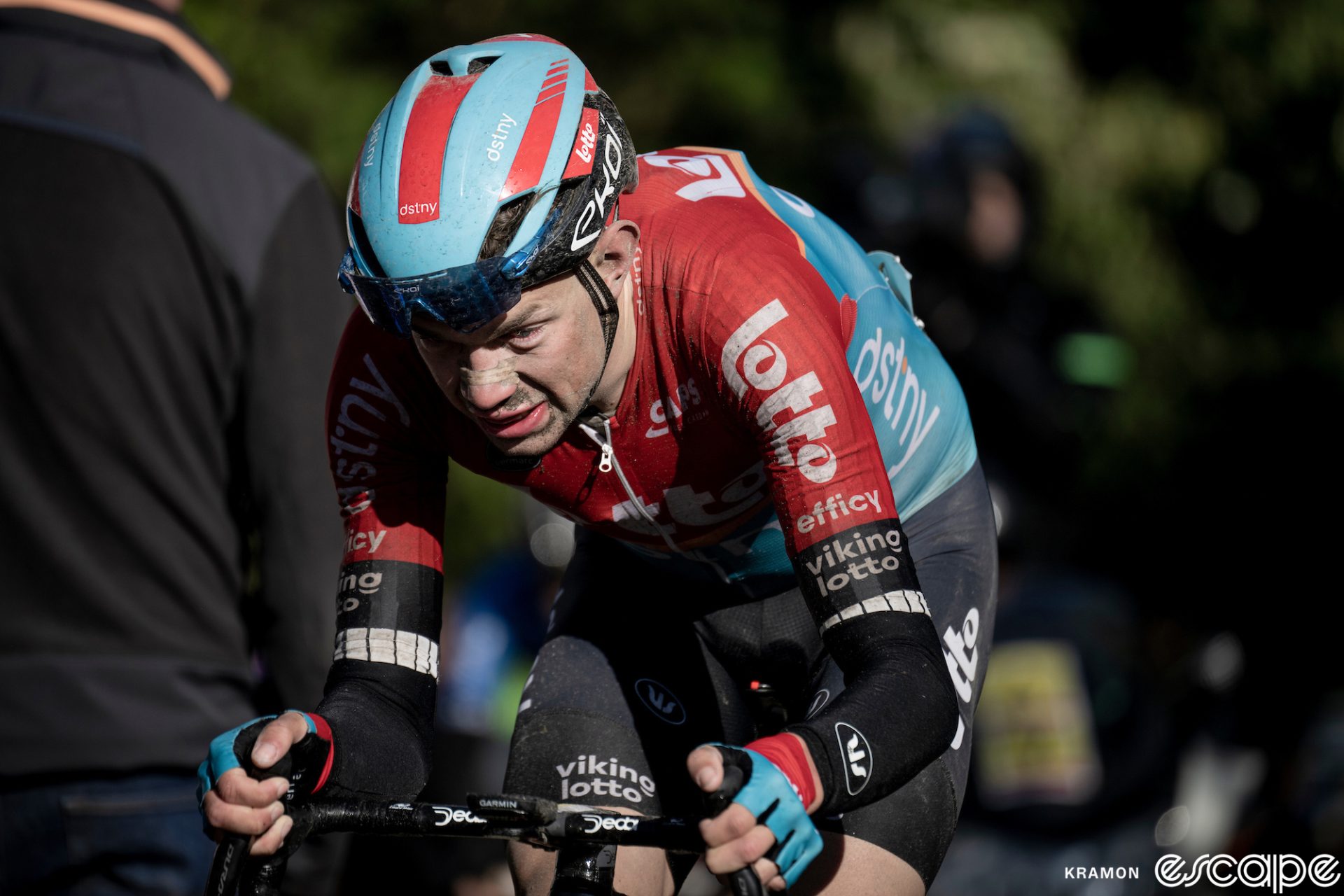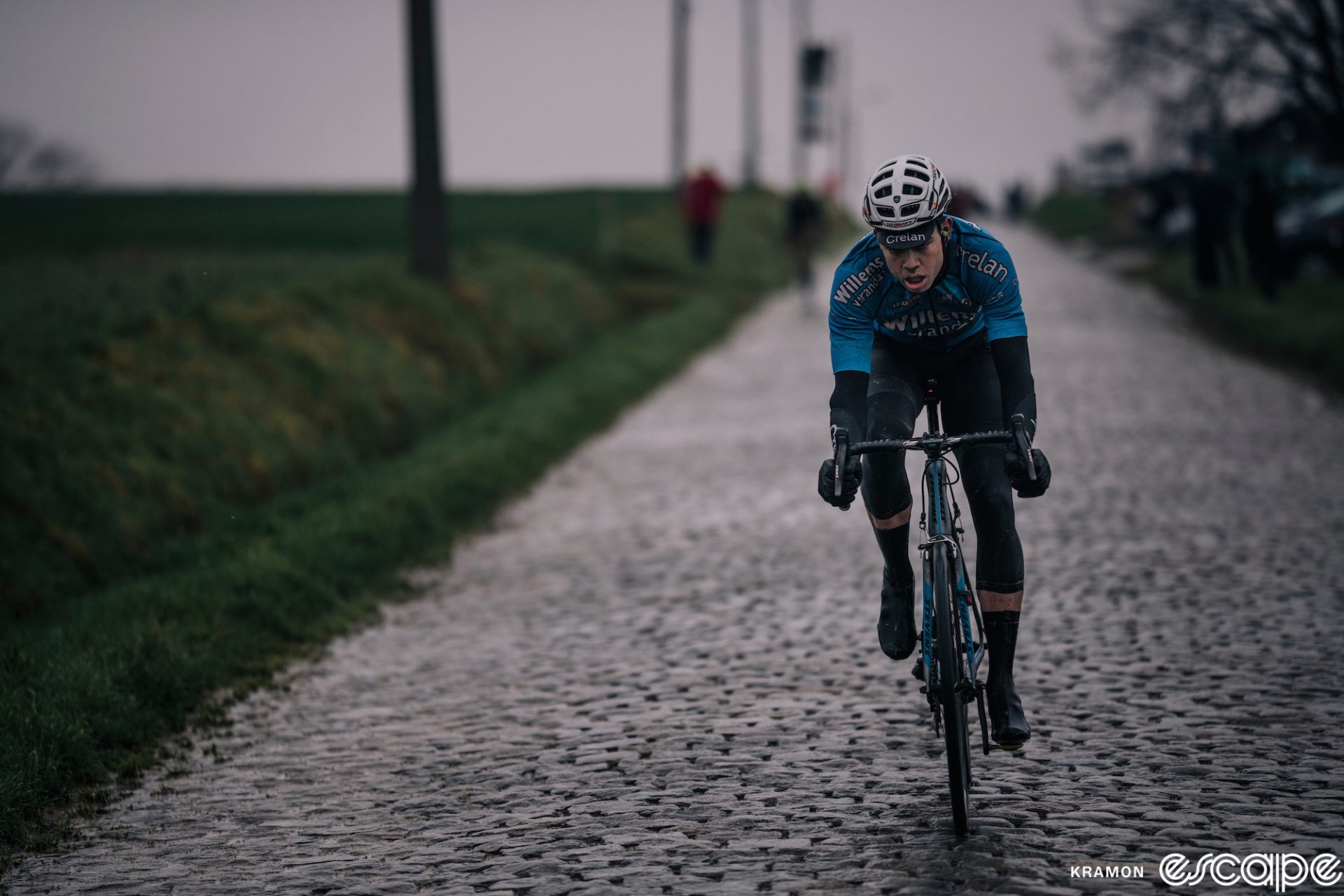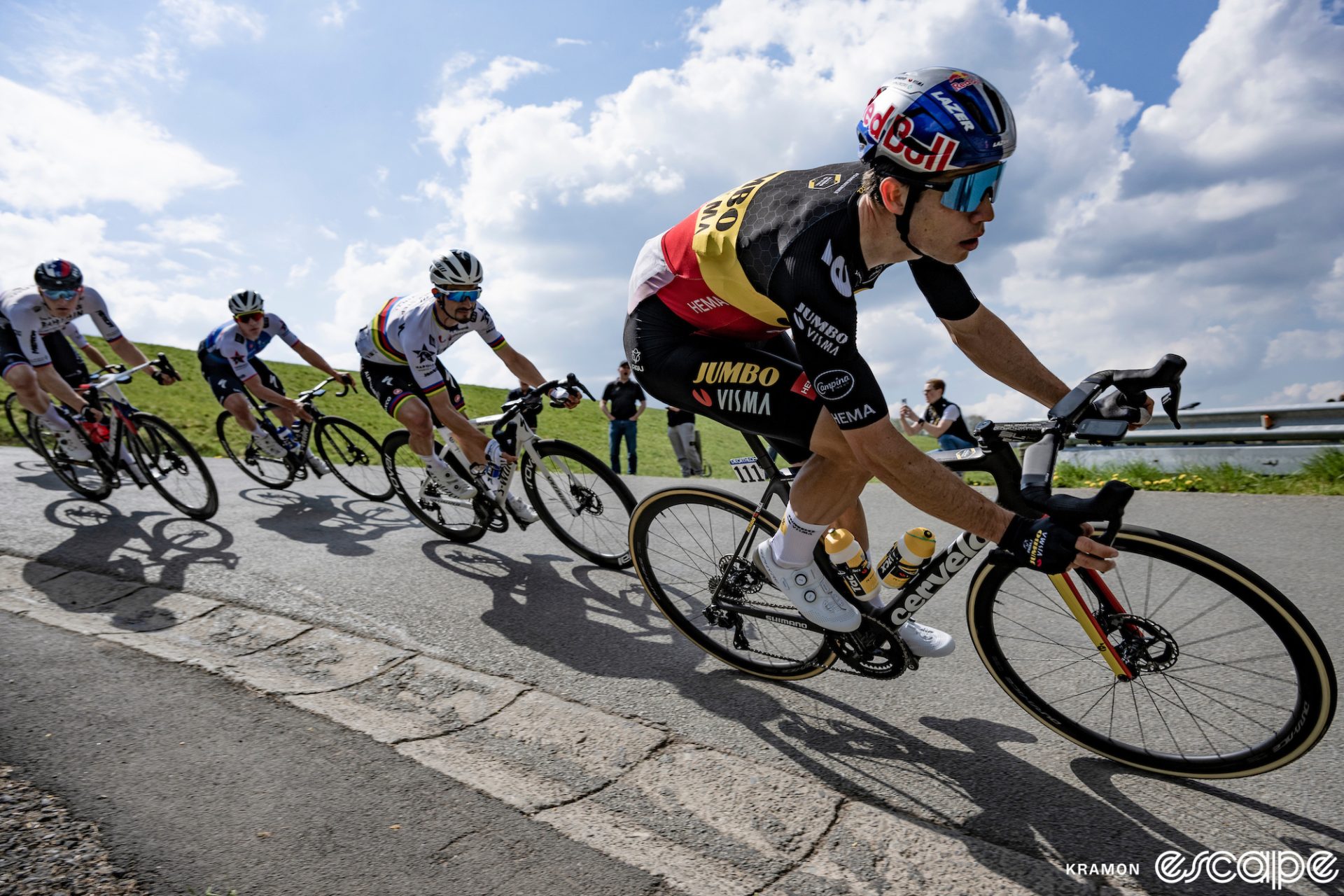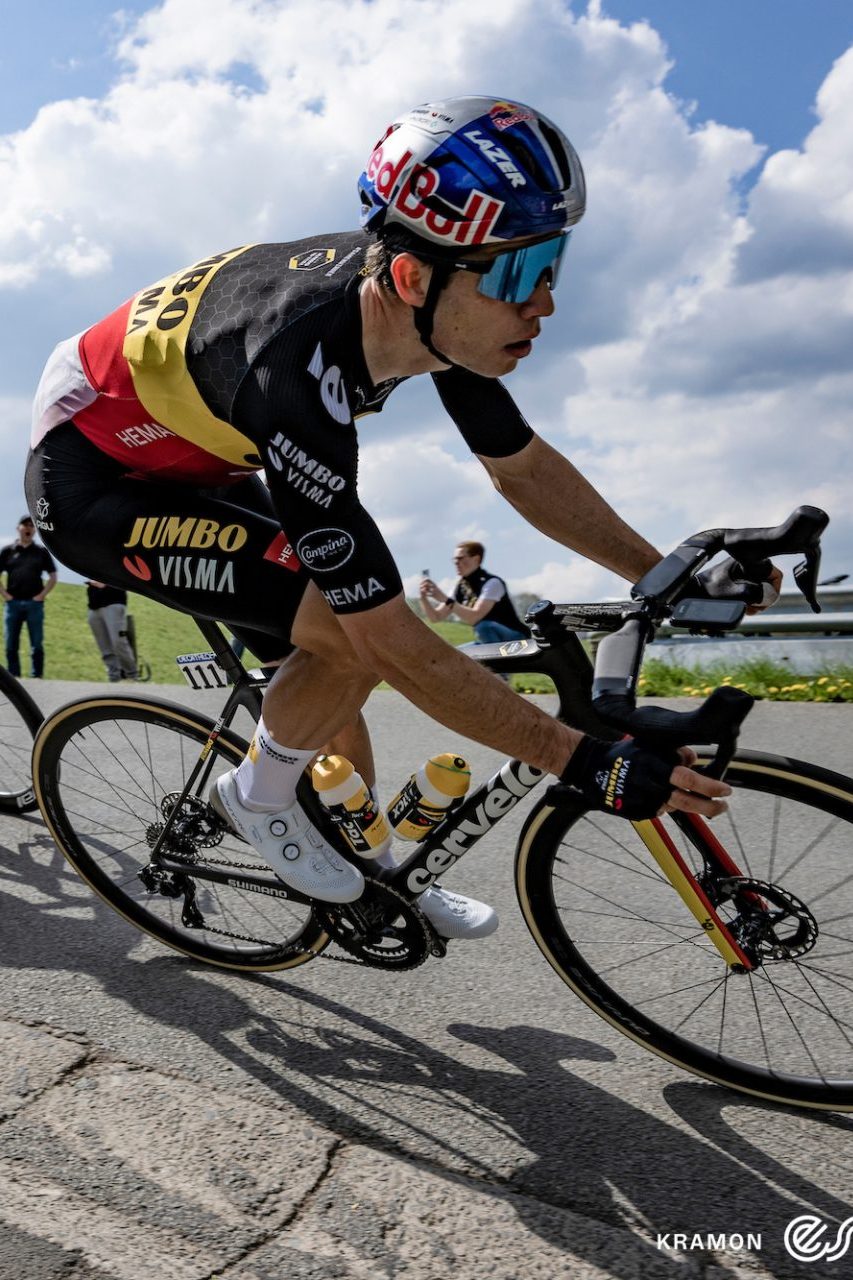Is it silly season already? News this week of the Bora-Hansgrohe team’s supposed interest in signing Wout van Aert and Remco Evenepoel – as soon as the 2025 season – must assuredly break a record for the earliest transfer scuttlebutt in pro cycling.
It also highlights a growing trend which, if not solved, will increasingly harm the sport.
The news (or rumor?) itself illustrates a few issues: while the item was widely reported in the media, every single one of those reports is based on a single, un-sourced claim in a Deutsche Press Agency article by the Deutsche Press. The article quotes Denk (who joined the team’s media day virtually, while on a business trip in California), but not on his supposed interest. Perhaps DPA chose not to tip its scoop to other reporters by asking Denk at a press conference about his supposed interest in the superstar duo. But to then run the assertion alongside Denk’s comments does raise questions about who was DPA’s source and what are their motivations for planting the rumor.
Van Aert’s agent didn’t respond to our request for comment, while Bora’s press representative declined to comment. At the Tour Down Under, Bora sports director Bernie Eisel carefully skirted the issue in comments to Velo’s Andrew Hood. Read the tea leaves and there’s no flat denial, but neither is there any evidence of actual interest beyond, “Yeah, those guys are really good riders; every team would want to sign them.” Days after all the breathless breaking-news reports, no one has yet dug up any more information (despite efforts by reporters like Hood). There’s probably room for a whole commentary on how the volume-based churn economy of an ad-driven business model warps media incentives, but that’s for another time.
The episode highlights a larger issue in the sport: what does the circus atmosphere around the rumor say about how pro cycling is really run, especially compared to other sports?
A rule in name only
Pro team sports are uniformly marked by clear rules around athlete contracts with teams. Transfer windows, trade deadlines, free agency: whether it’s American football, global football, baseball, basketball, hockey (the list goes on), leagues have defined windows and processes for athletes to move between teams. Doing so outside of those is almost always forbidden. Cycling has those features and rules, at least in name (except the trade deadline, which might be an odd fit since the sport has no playoffs and all WorldTour teams are always at least theoretically in contention at all major events).
Cycling’s transfer season starts August 1. And article 2.15.121 of the UCI rules on road races states, “Should a UCI WorldTeam or paying agent wish to engage a rider contracted to another UCI WorldTeam or UCI ProTeam such that the rider would begin to ride for the UCI WorldTeam before the expiry of the scheduled term of the contract with his current team, it shall firstly inform the Professional Cycling Council of this intention.” The team then has to contact the rider’s existing team.
That all seems abundantly clear about the timing of transfers, and what is the process for riders under contract. But those rules are also pretty clearly being ignored, because what cycling doesn’t have that those other leagues do is any kind of real enforcement mechanism against breaking said rules. Association sports generally look dimly on tampering with athletes under contract, and so the penalties for doing so tend to be severe: major fines, transfer bans, and – in sports with athlete drafts – revocation of draft picks are all levied against offenders. Those teeth largely keep teams from flouting the rules.

But that’s not the case in cycling, and this offseason in particular shows a concerning trend. Front and center is Visma-Lease a Bike, first with the curious saga of poaching Bora’s Cian Uijtdebroeks, and also reportedly making an unsuccessful overture to Lotto Dstny’s Andreas Kron. Both episodes are instructive. When Visma announced Uijtdebroeks’ transfer, Bora quickly and loudly objected. Since the Belgian could only transfer with Bora’s assent, it was pretty clear the rules hadn’t been strictly followed, certainly at first.
In the Kron case, the excuse for the failed transfer was that Kron reportedly approached Visma in the mistaken belief his contract allowed him to exit at any time to join a WorldTeam. But the only way Visma would NOT know that would be if they failed to follow the rules, because had they done so and approached the UCI and Lotto Dstny immediately, both would have said, “Um, yeah, he’s not allowed to leave without our approval first.” The way Lotto’s Stephane Heulot characterizes it, that didn’t happen.
Visma general manager Richard Plugge and his staff are absolutely Not Dumb and assuredly know all this. They didn’t forget. But did they simply judge that the penalty for breaking the tampering rules around Uijtdebroeks – a fine of as little as 30,000 Swiss francs (CHF) – was worth paying, if it was levied at all? Technically, the rules say, the fine is up to 500,000 CHF, and can be tripled for an approach that takes place outside the transfer window, which ends December 31. Now, if Plugge and staff reasonably think they get slapped with a 500,000 CHF fine (a sizable chunk of even Visma’s team budget), do they make that approach or nah? But when’s the last time you heard of a team being fined for trying to sign a rider who was under contract to a rival outfit?
The unsurprising result
In reality, there are no rules, only suggestions. Unlike association sports where the teams essentially are the league, there’s no real accountability between teams in cycling except mutual respect, which appears to be lacking in some cases. Enforcement power rests with the UCI, whose rules say that “If there is any indication” that the rules have been broken “the case will be brought before the Disciplinary Commission.” But the rules are silent what “any indication” means, or any process – if one exists – for teams to formally lodge a complaint that would start such a case. So it’s not clear whether the teams can police each other, and the UCI seemingly won’t do it even in egregious cases. Great system.
Similarly, the August 1 transfer window rule explicitly states that teams can’t recruit riders before that date, but then outlines that “recruit” means “concluding a contract.” Technically then, negotiations can start as early as January 1; rumors of transfers – which indicates at least a handshake deal – typically begin to bubble up in spring, and what team a rider is going to is often widely known before the Tour de France even if it can’t be legally signed and formally announced.
By roughly the halfway point of the season, a good chunk of the riders who are switching teams already know their future destination, salary, and contract length. What’s in it for them to ride aggressively for their current team for the rest of the time? This is why out-of-contract riders get sent to the Tour of Guangxi.
And without a salary cap, pro racing is already unbalanced between superteams who can afford any rider and those that must hunt for bargains and find development projects. If teams feel emboldened to poach riders who are under contract, what’s the incentive for those smaller teams to do all that work when any successes can be promptly snatched away without real penalty?
Look at the current system and see who benefits. Two of the richest and most powerful teams in the sport are Visma and UAE Team Emirates, and while the star of each team was “born and raised” inside it (which proves they absolutely can develop riders), the core of each of their Grand Tour teams is built with rider acquisitions, not homegrown talent. UAE supports Tadej Pogačar with a formidable lineup of João Almeida, Pavel Sivakov, Marc Soler, Jay Vine, and Adam Yates, all of whom were developed at other teams. Even young Juan Ayuso was plucked mid-season in 2021 from a Continental team after smashing the living hell out of the Baby Giro field that year. (UAE get something of a pass on poaching in this case because talent dev is what Conti teams are for, but it’s not as if UAE were the only ones to notice Ayuso’s talent.)

At Visma-Lease a Bike, Vingegaard is supported by riders like Christophe Laporte, Matteo Jorgenson, Wilco Kelderman, Sepp Kuss, Uijtdebroeks, Van Aert, and Dylan Van Baarle. Of those, only Kuss is a team development product. No, Van Aert does not qualify; by the end of 2018 he was a 24-year-old, three-time World Cyclocross Champion with seven pro road wins, including the HC Tour of Denmark stage race. Even I could have “developed” Wout van Aert from that point. Of particular relevance here, he unilaterally terminated his deal with Verandas Willems-Crelan that year to join Jumbo-Visma for 2019, for which breach of contract he later paid $800,000 – a settlement, I should note, ordered by a Belgian civil court, not the UCI. If the UCI fined Van Aert or Jumbo for their actions, there’s no public record of it.
Cycling, of course, is a free-agent sport; is it really a sign of a problem that these teams are built through signing proven veterans than developing young riders? Not necessarily, if it’s a two-way street where other proven veterans of more-or-less similar ability are departing. But in a sport as financially unbalanced as pro road racing, that’s not what happens; instead, talent gravitates to superteams while riders who didn’t work out or didn’t fit are the ones who go the other way. Sometimes they find better success elsewhere. But for every Neilson Powless, EF Education First can point to two or three Dani Martinezes or Van Baarles, both signed as rookies and developed there before they were nipped away by the superteam of the day, Ineos Grenadiers.
Bora, with its Primož Roglič signing and fresh infusion of energy-drink cash, seems keen to follow Visma’s lead now; other teams with big ambitions and budgets, like Lidl-Trek, could follow. That road leads to an even more deeply unbalanced sport than exists today: a pro cycling where well-funded superteams enjoy an endless transfer season, free to approach-and-poach any rider they want, any time, for the cost of a contract buyout that their billionaire owners happily pay because it’s peanuts compared to football money; and where other teams fight over the scraps and leftovers.
The better way
There’s a better way: pro cycling needs an actual transfer season, with a start date for contract negotiations, not just signed contracts. Say September 1, giving teams four full months to sign next year’s rosters. The sport also not only needs clear rules on tampering with under-contract riders, but major penalties for breaking them – penalties which are actually levied. Fines alone may not do it, for the reasons just noted (but they’d help). A non-monetary approach that might is a short-term ban on competition. A team-wide forced benching for the Tour of Flanders or Giro d’Italia will certainly keep a general manager’s eye from wandering.
It’s better because riders who do not have a three-year contract in hand by April for a new team next season are suitably more motivated to race hard this season for their existing one. It’s better because teams can devote resources to finding and developing young talent without worrying that at first flush of performance a richer team will swoop in and pluck them from the flock.
It’s better because a defined transfer window helps create an actual off-season, with actual news to drive fan interest, rather than mixing contract news and competition news during the season followed by months of no real activity. Notice, for instance, how leagues like the NFL and NBA work in this regard: there’s a title game or series, followed by a brief breather marked by coaching and management shuffles, then league meetings (on things like rules changes), a rookie draft, free agency, and finally training camp and pre-season. Even when there aren’t games, fans pay attention because newsworthy events all have their own, dedicated window. That’s how you build long-term interest.
It is, of course, grimly fascinating to me that the current dynamic is best illustrated through the behavior of Visma and Plugge, the self-same Plugge who’s trying to get everyone in the One Cycling boat with the sales pitch that a better-financed, more organized league would enrich the sport. It probably would do that, although if the Saudi funding rumors are true that may give some pause about participating. But Plugge is attempting to make that Three Musketeers case while acting like a pirate, a pattern which has clearly pissed off some of his contemporaries, who didn’t seem to much like him to begin with.
If Plugge really wants One Cycling to become a reality, one of the things he’s going to have to earn is trust. If the UCI wants to stave it off or keep its place of primacy in the sport, it needs to do the same. For all the talk about cycling reform, it hasn’t happened yet in almost two decades of plans and proposals, and there’s no guarantee it will now. But cycling doesn’t have to wait for capital-R reform to shape up and do business right.
Did we do a good job with this story?


